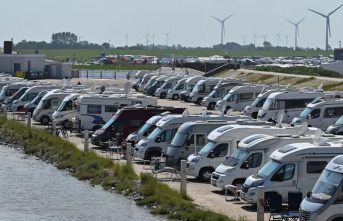After the loss-making week of the previous week, the German stock market ultimately failed in an attempt to stabilize. The Dax closed down 0.46 percent at 12,227.92 points, after being almost one percent higher at one point. In the end, the MDax for medium-sized stocks fell by 0.40 percent to 22,450.37 points.
Most of the other leading European indices also lost their feathers. The EuroStoxx 50 reached its lowest level since November 2020 and ended down 0.18 percent at 3342.56 points. In Paris, the Cac 40 lost around 0.2 percent, while in London the FTSE 100 managed a mini plus. In New York, the Dow Jones Industrial slipped around 0.5 percent at the end of European trading.
"The start of the week is characterized by cautious and wait-and-see trading. Hardly any investor is currently daring to come out of his cover and see how the other capital collection points are behaving," observed market expert Andreas Lipkow. In Europe, a lot of pessimism has already been priced in, further negative impulses would only be acknowledged with a shrug, Lipkow alluded to the weak Ifo index.
The Ifo business climate fell to its lowest level since May 2020 in September, while analysts had expected a less pronounced slowdown. "The German economy is sliding into a recession," commented Ifo President Clemens Fuest. The companies surveyed rated both their current situation and the expected development as worse.
A wave of fears of a deep economic downturn rolled over the stock markets worldwide in the past week. The Dax slipped to its lowest level since November 2020 on Friday. These worries were recently fueled by the central banks' vehement intervention to combat high inflation.
On Monday, bargain hunters mainly grabbed those stocks where the most recent wave of sales had caused prices to fall significantly. These included some values from the health sector in the Dax. Siemens Healthineers, Fresenius, FMC and Sartorius recorded price gains of between 0.2 and 1.2 percent.
Technology stocks were also in particularly high demand across Europe after the recent downturn. As the Dax leader, SAP gained 2.2 percent. The chip industry supplier Aixtron went up 1.3 percent in the MDax. Because the industry is heavily financed by credit and is therefore affected by rising interest rates, it has recently come under significant pressure.
Investors also grabbed those companies that had attracted negative attention in the recent past with profit warnings or cashed annual targets. The papers of the forklift manufacturer Kion climbed after the profit warning almost two weeks ago and the subsequent slide in prices by 1.8 percent.
Uniper shares continued their recovery of the past few trading days with a jump in price of almost 23 percent. An advisory body to the federal government sees the planned nationalization of the gas importer as a long-term threat to competition. In view of the general situation, the nationalization is "politically understandable", but should not be a long-term solution, said the chairman of the monopoly commission, Jürgen Kühling, of the "Süddeutsche Zeitung".
The euro fell to another 20-year low, last trading at $0.9610. The European Central Bank (ECB) had set the reference rate at $0.9646 in the afternoon.
On the bond market, the current yield rose from 1.91 percent on Friday to 1.99 percent. The Rex pension index fell by 0.58 percent to 128.38 points. The Bund future fell by 0.75 percent to 138.39 points.







